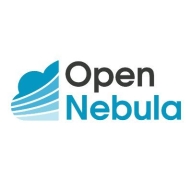


HPE OneSphere and OpenNebula are contenders in the cloud management platform sector. HPE OneSphere takes a lead in support, while OpenNebula stands out with its rich feature set.
Features: HPE OneSphere is known for its efficient management of hybrid cloud environments and robust multi-cloud capabilities. It provides strong management attributes. OpenNebula offers flexibility with its open-source approach and has extensive integration capabilities. Its adaptability allows for various custom implementations.
Ease of Deployment and Customer Service: HPE OneSphere ensures an easy deployment process tailored for enterprises, supported by dedicated channels. OpenNebula requires more technical skill due to its complexity but benefits from a supportive community, offering flexibility in development and custom solutions. The distinction is clear between HPE's simple deployment and OpenNebula's customizable nature.
Pricing and ROI: HPE OneSphere involves higher initial investments due to its premium management features and support, leading to a strong ROI for large-scale deployments. OpenNebula, as an open-source option, offers lower initial costs with potential savings for those able to harness its capabilities, suggesting high ROI through scalability and flexibility.


IBM Turbonomic offers automation, planning, and right-sizing recommendations to streamline resource management, improve efficiencies, and optimize costs across virtualized environments and cloud platforms.
IBM Turbonomic is valued for its capability to optimize resource allocation and monitor virtual environments efficiently. It facilitates automated decision-making in VM sizing, load balancing, and cost optimization for both on-premises and cloud deployments. Users can leverage insights for workload placement, ensure peak performance assurance, and effectively right-size across VMware and Azure. The ongoing transition to HTML5 aims to improve visual and navigational ease, while expanded reporting features are anticipated. Opportunities for improved training, documentation, and integrations enhance platform usability and functionality.
What Are the Key Features?In finance, IBM Turbonomic aids in maintaining platform efficiency during market fluctuations. Healthcare organizations leverage its capability for resource optimization during high-demand periods to enhance patient care support. Retailers use it for planning in peak seasons, ensuring resources align with fluctuating demand to maintain performance continuity.
HPE OneSphere is a multi-cloud management service that unifies management across different public clouds, on-premise private clouds and software-defined infrastructure.
OpenNebula provides the most simple but feature-rich and flexible solution for the comprehensive management of virtualized data centers to enable private, public and hybrid IaaS clouds. OpenNebula interoperability makes cloud an evolution by leveraging existing IT assets, protecting your investments, and avoiding vendor lock-in.
OpenNebula is a turnkey enterprise-ready solution that includes all the features needed to provide an on-premises (private) cloud offering, and to offer public cloud services.
We monitor all Cloud Management reviews to prevent fraudulent reviews and keep review quality high. We do not post reviews by company employees or direct competitors. We validate each review for authenticity via cross-reference with LinkedIn, and personal follow-up with the reviewer when necessary.